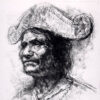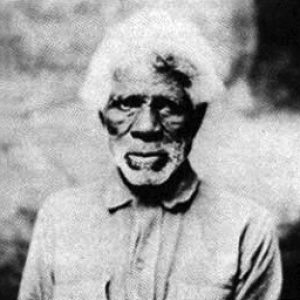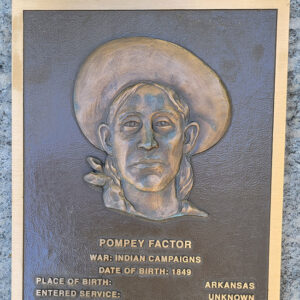calsfoundation@cals.org
Pompey Factor (1849–1928)
Pompey Factor was a scout for the U.S. Army during the Indian Wars. In 1875, he received the Medal of Honor for heroic actions during the course of the Red River War.
Factor was born in 1849 in Arkansas to Hardy Factor, a black Seminole chief and Indian scout, and an unknown Biloxi Indian woman.
The descendants of runaway slaves and Seminole Indians, many black Seminole fought against the U.S. Army in the Second Seminole War (1835–1842). By the end of that conflict, most of them were captured and removed to the Indian Territory. The fear of enslavement, however, drove many black Seminole to migrate to Mexico in the 1850s. Factor’s family was among those who emigrated.
Factor and the black Seminole remained in Mexico until 1870, when the U.S. Army recruited them to serve as Indian scouts. He was one of the first men to accept the U.S. offer. In return, the United States promised land for their families and located them on a reservation at Fort Clark, near Brackettville, Texas.
On August 16, 1870, Factor enlisted in the Army and was assigned the rank of private with the Detachment of Seminole Negro Indian Scouts and the Twenty-fourth Infantry, an all-black regiment. As a scout, he performed reconnaissance duties in Texas for the Army by tracking the movements of American Indians who remained free and refused to go to reservations. By 1870, the United States government and tribes of the southern plains had signed treaties that established reservations in Indian Territory, but many chiefs did not sign and refused to lead their people to the reservations. The Army attempted to force the free Indians to the reservations. As part of this effort, the Army employed scouts who were Indian because they were considered to be excellent trackers, and they could help demoralize the Indians whom the Army was fighting. The scouts identified any Indian groups they located and determined their strength. Although the scouts were not expected to fight in any battles, they frequently did.
In the midst of the Red River War (1874–1875) between the United States and the Comanche and Kiowa, Factor was involved in a skirmish on April 25, 1875. Indian scouts Factor, Sergeant John Ward, and Trumpeter Isaac Payne, along with their commander, Lieutenant John L. Bullis, came upon the trail of a herd of seventy-five horses they suspected had been taken from white settlers. They followed the tracks to the Eagle’s Nest Crossing, just east of present-day Langtry, Texas, where they spotted the horses and twenty-five to thirty Comanche. Factor and his companions took cover within seventy-five yards of the Comanche and opened fire. They killed three warriors and wounded another. Twice they took the horse herd but both times had to retreat and take cover. The scouts then realized they were about to be encircled by the Comanche, which would make them unable to get to their own horses. They retreated to their horses and started to ride away. Sergeant Ward then noticed that Lieutenant Bullis was not able to mount his frightened horse and was nearly surrounded by the Comanche. He alerted Factor and Payne, and they turned around to rescue their commander. Under heavy fire, Ward pulled Bullis onto his horse while Factor and Payne provided cover. The scouts then rode to safety.
Factor and his fellow scouts were awarded the Medal of Honor on May 28, 1875, for the bravery they exhibited at Eagle’s Nest Crossing. They were three of only eighteen black soldiers during the Indian Wars who received such an honor.
On New Year’s Day, 1877, less than two years after receiving the medal, Factor left the scouts and returned to Mexico. He had become concerned by the rising tensions between black Seminole and white settlers in southern Texas. Two scouts, one of whom had received the Medal of Honor in another engagement, had been murdered.
On May 25, 1879, Factor returned to the United States and rejoined the scouts for a short time. In 1880, he again went to Mexico. In 1926, he returned to Texas. His request for a pension was initially denied but was finally approved before his death. Still, he died destitute on March 28, 1928, and was buried in the Seminole Indian Scout Cemetery at Brackettville, Texas.
For additional information:
Johnson, John Allen. “The Medal of Honor and Sergeant John Ward and Private Pompey Factor.” Arkansas Historical Quarterly 29 (Winter 1970): 361–75.
Mulroy, Kevin. Freedom on the Border. Lubbock: Texas Tech University Press, 1993.
Porter, Kenneth W. The Black Seminoles. Revised and edited by Alcione M. Amos and Thomas P. Senter. Gainesville: University Press of Florida, 1996.
———. “The Seminole Negro-Indian Scouts, 1870–1881.” Southwestern Historical Quarterly 55 (January 1952): 358–77.
Schubert, Frank N. Black Valor: Buffalo Soldiers and the Medal of Honor, 1870–1898. Wilmington, DE: Scholarly Resources, 1997.
Joseph Patrick Key
Arkansas State University
This entry, originally published in Arkansas Biography: A Collection of Notable Lives, appears in the CALS Encyclopedia of Arkansas in an altered form. Arkansas Biography is available from the University of Arkansas Press.
 Native Americans
Native Americans Post-Reconstruction through the Gilded Age, 1875 through 1900
Post-Reconstruction through the Gilded Age, 1875 through 1900 Pompey Factor
Pompey Factor  Pompey Factor Plaque
Pompey Factor Plaque 




Comments
No comments on this entry yet.